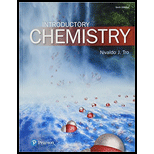
Interpretation: The minimum volume of hydrogen gas needed for the complete hydrogenation of propyne is to be calculated at STP.
Concept Introduction:
Hydrogenation reaction is the
To determine the volume of hydrogen gas needed for the complete hydrogenation of the given amount of propyne, follow the following solution map:
The mass of propyne is converted into their corresponding moles by the use of their corresponding molar masses. The conversion factor used to convert the moles of propyne into the moles of
Want to see the full answer?
Check out a sample textbook solution
Chapter 18 Solutions
INTRODUCTORY CHEMISTRY-W/SEL.SOLN.MAN.
- Explain what is meant by oxidation in organic moleculesand provide an example of an oxidation reaction involving an aldehydearrow_forward1. What are the distinguishing physical properties of carboxylic acids? Describe eac 2. What determines the major physical properties of carboxylic acids? Why? 3. What does polarity of compound or molecule mean?arrow_forwardWrite three difference between ethanol and ethanoic acid on the basis of chemical properties?arrow_forward

 Chemistry: An Atoms First ApproachChemistryISBN:9781305079243Author:Steven S. Zumdahl, Susan A. ZumdahlPublisher:Cengage Learning
Chemistry: An Atoms First ApproachChemistryISBN:9781305079243Author:Steven S. Zumdahl, Susan A. ZumdahlPublisher:Cengage Learning ChemistryChemistryISBN:9781305957404Author:Steven S. Zumdahl, Susan A. Zumdahl, Donald J. DeCostePublisher:Cengage Learning
ChemistryChemistryISBN:9781305957404Author:Steven S. Zumdahl, Susan A. Zumdahl, Donald J. DeCostePublisher:Cengage Learning Chemistry for Today: General, Organic, and Bioche...ChemistryISBN:9781305960060Author:Spencer L. Seager, Michael R. Slabaugh, Maren S. HansenPublisher:Cengage LearningChemistry: Matter and ChangeChemistryISBN:9780078746376Author:Dinah Zike, Laurel Dingrando, Nicholas Hainen, Cheryl WistromPublisher:Glencoe/McGraw-Hill School Pub Co
Chemistry for Today: General, Organic, and Bioche...ChemistryISBN:9781305960060Author:Spencer L. Seager, Michael R. Slabaugh, Maren S. HansenPublisher:Cengage LearningChemistry: Matter and ChangeChemistryISBN:9780078746376Author:Dinah Zike, Laurel Dingrando, Nicholas Hainen, Cheryl WistromPublisher:Glencoe/McGraw-Hill School Pub Co





